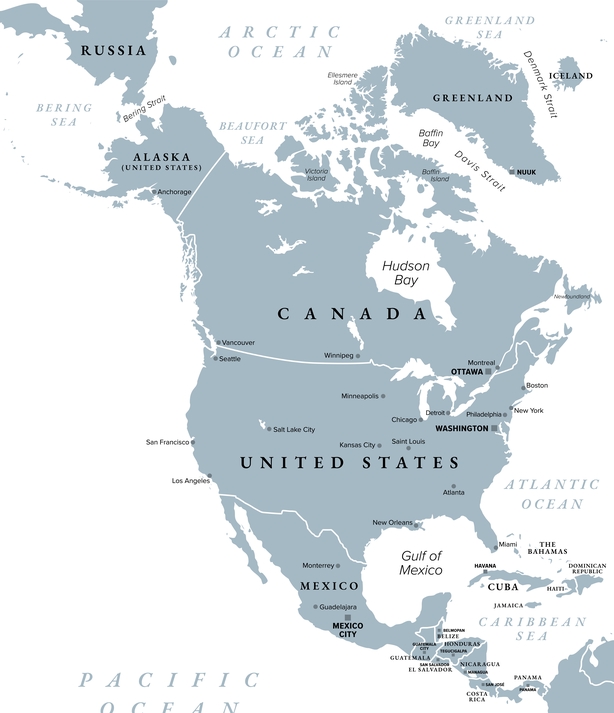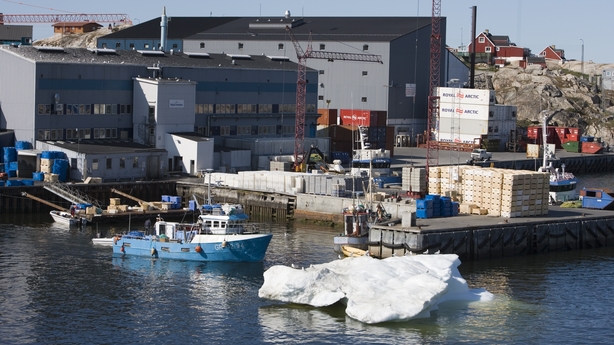Greenland, which US President-elect Donald Trump wants to annex, is a self-governing Danish territory covered in ice, with untapped mineral resources and geostrategic importance.
Last month, Mr Trump said that control of the Arctic island was "an absolute necessity" for "purposes of National Security and Freedom throughout the World".
But the Republican, who takes office on 20 January, set off new alarm bells this week when he refused to rule out a military intervention, sparking astonishment in Denmark, Greenland's capital Nuuk and across Europe.
Copenhagen, though, has said it is "open to a dialogue" with Washington to ensure US interests are safeguarded at a time when rivalries with China and Russia in the Arctic are growing.
Despite its autonomy, Greenland is dependent on Denmark for law enforcement, monetary policy, foreign affairs, defence and security policy.
However, with its capital closer to New York than Copenhagen, Greenland is in the United States' "zone of interest", historian Astrid Andersen, of the Danish Institute of International Studies, said.
"During the war - while Denmark was occupied by Germany - the US took over Greenland. In a sense they have never left," she explained.
The US has a military base in the northwest of the territory and the island provides the shortest trajectory for launching any missiles towards Russia.
Political scientist Ulrik Pram Gad, also of the Danish Institute of International Studies, said the US has "legitimate complaints about the lack of surveillance of the airspace and submarine areas east of Greenland".
When new shipping lanes are freed up due to melting ice the problem is legitimate but Mr Gad believes that Mr Trump is using "exaggerated terms".
During his first term in office, he floated the idea in 2019 that he wanted to buy the territory, which was rebuffed.

Experts are still perplexed at what the incoming US government is actually planning.
"We are still in the waiting room when it comes to knowing exactly what the Trump administration means," said Lill Rastad Bjorst, an Associate Professor at Aalborg University in Denmark, who specialises in Greenland.
Since 2009, Greenlanders have been in charge of deciding how their natural resources are used.
Access to the territory's mineral resources is considered crucial by the US, which signed a memorandum on cooperation in the sector in 2019.
The European Union followed suit four years later with its own agreement.
Greenland's soil is well explored, which has enabled a detailed map of resources to be drawn up.
The EU has identified 25 of the 34 minerals on its official list of critical raw materials in Greenland, including rare earth minerals.
"As the demand for minerals is rising, there is a need to go and look for untapped resources," said Ditte Brasso Sorensen, an analyst at Think Tank Europa.
"Actors are more and more aware they need to diversify their sources, especially when it comes to the dependence to China on rare earth elements."
Adding to this is the fear that China will get its hands on the mineral resources, she explained.
Yet the mining sector in Greenland is largely non-existent.
There are only two mines on the island - one for rubies, which is looking for new investors, and the other for anorthosite, a rock containing titanium.

Economically, Greenland, which is seeking to free itself from Denmark, depends on a subsidy from Copenhagen - which accounts for a fifth of its gross domestic product - and on fishing.
Hopes are in part pinned on the opening of an international airport in Nuuk last November to help to develop tourism in the Arctic region.
Infrastructure is also a key issue for the development of the mining industry.
"When it comes to extractive industries, Trump is putting Greenland on the mining map in discourse but it's hard to say how it could evolve as there is a lack of investors," Ms Rastad Bjorst noted.
Ms Sorensen also stressed the inherent difficulties of such endeavours in the territory with its "very harsh weather conditions, a protected environment and lots of costs" as well as "the need to develop the physical and digital infrastructure".
"The untested regulatory system also adds to the uncertainties," she said.
Public opposition to uranium mining in southern Greenland prompted legislation banning the extraction of radioactive products.
Another potential resource to be exploited is oil, but it is at a standstill.

